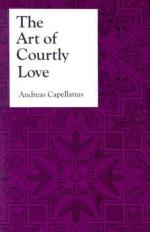
|
| Name: _________________________ | Period: ___________________ |
This test consists of 15 multiple choice questions and 5 short answer questions.
Multiple Choice Questions
1. When the man of higher nobility spoke to a woman of higher nobility, what did the man insist was a great good?
(a) Love between a man and a woman.
(b) Self-acceptance.
(c) The respect of peers.
(d) Love of someone from a lower class.
2. When the man of higher nobility spoke to a woman of higher nobility, what was the man advised to avoid?
(a) Embarrassing her.
(b) Praising her excessively.
(c) Insisting that his rank was more prestigious than hers.
(d) Saying anything that would ridicule himself in her eyes.
3. When the man of higher nobility spoke to a woman of higher nobility, what did the woman look for a chance to do?
(a) Correct him.
(b) Flatter him.
(c) Embrace him.
(d) Ridicule him.
4. A member of the most noble class was called what?
(a) Master.
(b) Clerk.
(c) Highness.
(d) Regency.
5. What did the author identify as a sure way to decrease love?
(a) Seeing each other too rarely.
(b) Being together too much.
(c) Expressing anger.
(d) Developing feelings of jealousy.
6. What did the author say about a raped woman's future?
(a) She is too damaged to love.
(b) She is undeserving of love.
(c) She is sure to find a great love.
(d) She deserves love.
7. If a greedy woman truly loved her man, what would she be hesitant to do?
(a) Neglect his needs.
(b) Belittle him.
(c) Ask so much of him.
(d) Destroy him.
8. How did the higher noblewoman respond to the the nobleman's question about loving two women at the same time?
(a) The lover must choose one or risk losing both.
(b) The lover must keep chaste for the beloved.
(c) The lover must release both women and remain chaste.
(d) The lover must seek God's guidance.
9. What did the author advise a woman to do when she has loved a man who was unworthy of her?
(a) Realize her mistake and end things quickly.
(b) Improve him or give up.
(c) Lower her own standards and embrace love.
(d) Seek the counsel of the clergy for direction.
10. What did the man of the clergy admit about love with a woman?
(a) That it could ruin their lives.
(b) That it was risky.
(c) That it was forbidden.
(d) That she would never be worthy.
11. When a man of higher nobility spoke to a woman of higher nobility, what argument did they have about love?
(a) About its prudence.
(b) About its ability to frighten.
(c) About its deception.
(d) About its ability to heal.
12. What did the author say of the love of prostitutes?
(a) It should be a last resort.
(b) It should be enjoyed without shame.
(c) It should be absolutely resisted.
(d) It should be a man's personal choice.
13. Up until the beginning of Chapters 7-12, which class, often considered the most noble, was unmentioned?
(a) The serfs.
(b) The nobility.
(c) The clergy.
(d) The Royal Family.
14. Under what condition may a man indulge in the "solace of the flesh" and still retain love?
(a) As long as both have professed love to the other.
(b) As long as they have made a commitment to eachother, such as engagement.
(c) As long as it is not wearisome to the woman.
(d) As long as they are married.
15. Why were nuns advised to fiercely avoid love?
(a) It would stir up God's wrath.
(b) They loved money too much.
(c) They were not worthy of love.
(d) They were doomed to never find true love.
Short Answer Questions
1. The author encouraged Walter to find a woman who would love him regardless of what?
2. In the author's reviews of decisions in love cases, what was the difference between the two men in the third case?
3. What did the author think greedy women should do?
4. When the man of higher nobility spoke to the woman of higher nobility, of what did he argue that her resistance was an indicator?
5. What did the author advise a woman to do if her man was unfaithful?
|
This section contains 686 words (approx. 3 pages at 300 words per page) |

|




